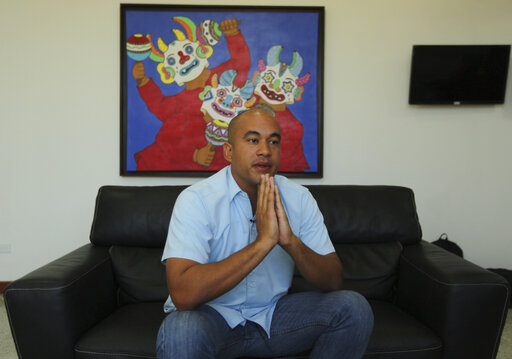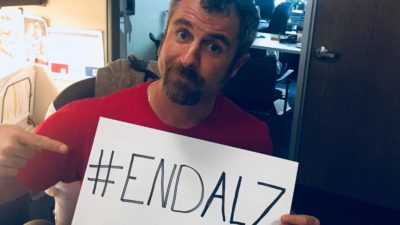CARACAS, Venezuela (AP) — Amid the political turmoil roiling Venezuela it’s easy to overlook this milestone: the 20th anniversary on Saturday of Hugo Chavez’s Bolivarian revolution.
On Feb. 2, 1999, Chavez took office with a fiery anti-imperialist rhetoric that would inspire leaders across Latin America and reshape the region’s relations with Washington.
But many now wonder how much longer the late leader’s political movement — known as Chavismo — can survive with an economy on its knees and the U.S. pushing harder than ever for regime change.
One person refusing to throw in the towel is Hector Rodriguez, the governor of Miranda state and the face of the next generation of the ruling socialist party, whose meteoric rise could be undone by the current crisis.
The 36-year-old was just a teenager when Chavez took power. Now one of the last remaining allies of President Nicolas Maduro who still enjoys a respectable approval rating, Rodriguez is searching, along with other loyalists, for answers to how to rescue the country, and with it, Chavez’s increasingly tarnished legacy.
Rodriguez says that for too long Chavismo has neglected the middle class, alienated moderate opponents and failed to efficiently manage the oil-dependent economy.
“We don’t like to talk to the middle class,” acknowledged Rodriguez, whose youthful energy and popular appeal make him the ideological mirror of Juan Guaido, the 35-year-old opposition leader who is challenging Maduro for recognition as Venezuela’s rightful president.
“We disparage them, we hit them rhetorically. This is a mistake we’ve committed,” Rodriguez told The Associated Press from his office at the Carlota air base in Caracas.
Chavez was elected in 1998 with the overwhelming support of Venezuela’s middle class, and even some of the major media outlets he would later try to muzzle. But support for Maduro, his hand-picked successor, has plummeted amid galloping hyperinflation and widespread shortages to just 20 percent — a core group of ideological die-hards, government-connected insiders and poor voters dependent on handouts.
It’s a disastrous tumble but still represent a significant bloc of voters who aren’t going away even if Maduro does. Rodriguez says the opposition is ignoring them at its own peril by betting so heavily on what he called a “radical” strategy of violent confrontation dictated by the U.S.
“The U.S. solution is, ‘Give up or I’ll invade you,’” he said.
Guaido asserts that the constitution gives him the right as president of the opposition-controlled National Assembly to assume power from Maduro after the Venezuelan leader banned opponents from running in an election last year that has been widely condemned as illegitimate. Rodriguez strongly disputes that, reading from a blue-covered copy of the charter that he says shows such a move is allowed only in the event Maduro were to die, resign or be declared unfit for the presidency by a board of medical experts appointed by the Supreme Court.
Spotted by Chavez when he was a student leader, Rodriguez was a cabinet minister by the age of 28 and has a held a number of top posts since. In 2015, he assumed the task of leading a bloc of pro-government lawmakers when the opposition took control of congress, earning a reputation for delivering well-thought-out attacks that went beyond the usual ideological banter of the traditional revolutionary standard-bearers.
In 2017 he was elected governor of Miranda state, for years an opposition stronghold and which includes part of the capital. In office, he’s reached out to business owners who normally side with the opposition.
Some call it “Light Chavismo,” although Rodriguez’s more moderate discourse belies an unflinching loyalty to Maduro. He was one of just a handful of allies — and the only one not sanctioned by the U.S. for rights abuses, corruption or drug-trafficking — who stood alongside the embattled socialist on the balcony of the presidential palace when he announced he was severing diplomatic relations with the U.S. last week. In the event of a political transition, many expect Rodriguez to play a key role.
“The opposition sees him as someone they can negotiate with,” said Luis Vicente Leon, a Caracas-based pollster.
For now, though, Rodriguez isn’t looking to give in. He acknowledges Chavismo’s future — as well as his own political ambitions — are at risk if the current course isn’t corrected soon. He said the U.S. oil sanctions announced this week will likely choke off Venezuela’s access to hard currency earnings, making it harder to import food already in short supply.
He also acknowledges the ruling party didn’t do enough to train scientists and engineers, and wean Venezuela off its dependency on oil exports and the U.S.-dominated global financial system.
“It’s a very complex situation,” said Rodriguez. “But we Bolivarians aren’t going to surrender. We’re going to fight.”
__
Sanchez on Twitter: https://twitter.com/fisanchezn
Goodman on Twitter: https://twitter.com/APjoshgoodman





